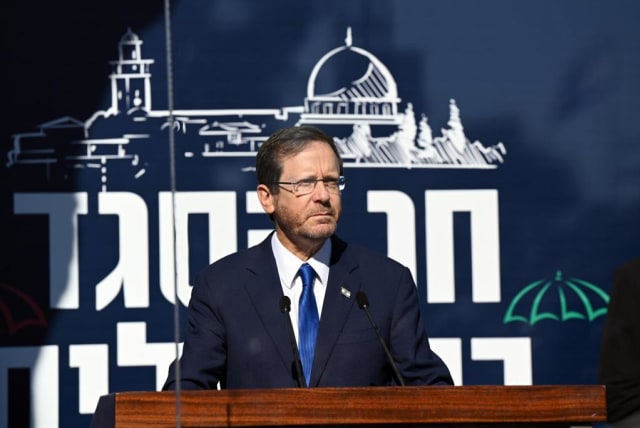Political outcry after 'fake' Herzog judicial reform outline published

The fake outline was published the day after Herzog had called an emergency meeting of local government officials about lobbying for judicial reform negotiation.
A judicial reform negotiation outline, published on Tuesday, was not produced by President Isaac Herzog, his office clarified following outcry about the document by politicians and activists.
“The publications this morning were not done with the knowledge of the president or anyone on his behalf. It must be clarified and emphasized that this is not the outline of the president,” the President’s Residence said. “This is one proposal out of many that have been forwarded in recent weeks by researchers and academics from various institutes.”
The outline was published the day after Herzog called an emergency meeting of local government officials about lobbying for judicial reform negotiation. Herzog said he would present an outline soon, but his office said Tuesday morning that the president hasn’t finished writing it, promising that he would present it to the public when it is complete.
Justice Minister Yariv Levin and Constitution, Law and Justice Committee Chairman Simcha Rothman welcomed the president’s response, saying the outline published was a “sterilization” of the reform plan.
The reform leaders encouraged the efforts of Herzog and other actors seeking to reach a dialogue and agreement outline. They said it was clear that an outline would need to address the essentials of the reform.
“There is a broad consensus, also in the public, in academia, in hi-tech, economy and among the members of the Knesset on the need for a broad and comprehensive reform and also on its fundamental principles,” said Rothman and Levin. “We will continue to promote the legislation as planned, and we will continue to try to reach broad agreements just as we have done in past months.”
Religious Zionist Party MK Rothman also decried on social media the reaction to his statement on “a fake presidential outline.” Rothman said he and Levin were being framed as being against the president because of their objections to the outline published that morning.
Labor leader Merav Michaeli said on Twitter that the outline was close to Levin and Rothman’s original position. She reiterated her Monday position that while she appreciated the “good intentions,” there could be no negotiations with compromise on essential values.
The outline initially attributed to Herzog included an override clause with a majority of 70 MKs and a limitation of the reasonableness clause. A special method for enacting Israel’s quasi-constitutional Basic Laws was also included, and had been part of Herzog’s previous five-point proposal.
Opponents and Proponents speak out
The protest group Struggle Against Dictatorship responded harshly to the outline, saying it gave the reformist camp everything they demanded. They criticized the president for unilaterally developing an outline without transparency.
“[Prime Minister Benjamin] Netanyahu, Levin, [Finance Minister Bezalel] Smotrich and Rothman got everything they wanted: A political court, a neutered High Court of Justice, a government immune to any criticism [and] a sterilized justice system,” said the protest leaders. “Millions who have been fighting for democracy in Israel for two months have been slapped in the face.”
Former prime minister Naftali Bennett said that “the apparent direction of the president’s outline seems balanced and good, and should be adopted.” He called on both sides to compromise and adopt Herzog’s outline to avoid civil war.
Other actors submitted their own outlines for negotiation on Tuesday in response to Herzog’s initial announcement. Former Shin Bet chief Yuval Diskin sent a letter to Netanyahu and Herzog calling for the ending of legislation, the firing of Smotrich and National Security Minister Itamar Ben-Gvir, forming a unity government and the prime minister’s retirement.
The Israel Democracy Institute offered its own, more realistic outline based on the plan published on Tuesday, including changing the majority for High Court appointments to 8 out of 11, and special methods for Basic Law enactment and a system for more interdependent agreements.
Binyamin Regional Council head Israel Ganz said on Tuesday that the reform is necessary and that dialogue was needed without preconditions.
“I spoke with the leaders of the reform – they are ready,” said Ganz. “But currently, [opposition leader Yair] Lapid and [National Union head Benny] Gantz are not ready to take this step of sitting in a closed room and talking. I call on both of them: come, sit, talk! If they come willingly, I am convinced that agreements can be reached about the important things.”
Herzog attended a traditional Purim reading of the Book of Esther on Monday night in Herzliya, and said he hoped that things would turn around in the coming weeks.
Jerusalem Post Store
`; document.getElementById("linkPremium").innerHTML = cont; var divWithLink = document.getElementById("premium-link"); if (divWithLink !== null && divWithLink !== 'undefined') { divWithLink.style.border = "solid 1px #cb0f3e"; divWithLink.style.textAlign = "center"; divWithLink.style.marginBottom = "15px"; divWithLink.style.marginTop = "15px"; divWithLink.style.width = "100%"; divWithLink.style.backgroundColor = "#122952"; divWithLink.style.color = "#ffffff"; divWithLink.style.lineHeight = "1.5"; } } (function (v, i) { });

